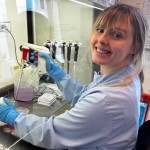

Detection, prevention and intervention
Research theme aim: to identify novel points of intervention for a wide range of pathogens, and train students in diagnostics and development of novel antimicrobials.
Exemplar project: Designing an antiviral drug for Rift Valley Fever Virus.
Research projects and students

Assessing the role of microRNAs in CHIKV Cellular Entry and Their Therapeutic Applications
Elle Campbell
Supervising institutes: University of Sussex; Universty
About Elle
What do you enjoy most about your PhD?
I find the concept of researching a novel topic very exciting. I love the independence you get to direct your research during a PhD. I also decided to choose a project which is quite different to things I have done before and therefore, I have really enjoyed learning new techniques. Meeting other researchers and getting the chance to present my work at the WHO symposium and other conferences has been a good way to increase my confidence and get different points of view and inspiration to help shape my project.
Could you share details of the journey that led to your PhD, including any experiences (professional, personal or educational) that have helped shape that path?
I decided I wanted to be a virologist when I undertook a placement year at The Pirbright Institute as part of my undergraduate degree. I loved learning new techniques, going to conferences and being able to attend weekly seminars. I finished my degree in the COVID-19 pandemic and, instead of going straight back into being a student, I decided to work at UKHSA Porton Down as a research scientist. During my time at Porton Down, I learnt how to work at Containment Level 3 and I wrote a number of grant and scientific manuscripts. Yet, the research I was working on was very niche and so, I decided to pursue a PhD to increase my skillset and get the opportunity to work in a university environment.
Supervisors
- Dr Leandro Castellano (University of Sussex)
- Dr Edward Wright (University of Sussex)
- Dr Naomi Forrester-Soto (The Pirbright Institute)

Designing an antiviral drug for Rift Valley Fever Virus
Natalie Goel
Supervising institutes: University of Sussex; Defence Science and Technology Laboratory (Dstl)
About Natalie
What do you enjoy most about your PhD?
My favourite part of my PhD is being in the laboratory, learning laboratory skills and techniques that are novel to me. Every day I am building my confidence and proficiency within the lab, which is exciting. I appreciate being challenged to manage my own experiments and project, while also contributing to a wider scientific question. Researching my project and undertaking wider reading around the topic interests me, and I enjoy having a tailored focus to extend my knowledge on.
Could you share details of the journey that led to your PhD, including any experiences (professional, personal or educational) that have helped shape that path?
Completing my undergraduate degree in Bioveterinary Science gave me an understanding of the importance of zoonotic disease control along with the opportunity to undertake a laboratory research project in molecular biology. My research project allowed me to absorb working within a research focussed laboratory, as well as develop my knowledge in molecular research which is the basis of my PhD. I also completed a year in industry during my undergraduate degree where I gained experience in a diagnostic laboratory. This opportunity consolidated my goal to pursue a career in a laboratory, as well as providing me with industry experience and knowledge within a range of techniques. Undertaking this experience enhanced my confidence within the laboratory, giving me the self-assurance I needed to apply for a PhD. Overall, both my undergraduate and industry experience combined confirmed that completing a PhD was the appropriate next step for me.
Supervisors
- Dr Antony Oliver (University of Sussex)
- Dr Frances Pearl (University of Sussex)
- Rachel Ireland (Dstl)

Harnessing antibody responses to develop therapeutic strategies for respiratory infections
Emily Briggs
Supervising institutes: University of Surrey; The Pirbright Institute
About Emily
What do you enjoy most about your PhD?
I enjoy the breadth of skills I've gained throughout my PhD. This project has allowed me to explore a range of techniques from flow cytometry to sequencing and cloning, and has given me experience in running large in vivo studies.
Could you share details of the journey that led to your PhD, including any experiences (professional, personal or educational) that have helped shape that path?
My undergraduate degree was in Infection and Immunity BSc (First-class Hons) which allowed me to undertake a 6 month research project in my final year. This gave me my first experience of lab based research. After my undergraduate degree I then undertook a MSc by Research at the University of St Andrews which allowed me to fully immerse myself in the world of scientific research and understand more about what a PhD would look like as well as learning more laboratory techniques and skills.
Supervisors
- Professor Elma Tchilian (The Pirbright Institute),
- Professor Christine Rollier (University of Surrey)
- Professor Carlos Maluquer de Motes (University of Surrey)

Defining the immunopotentiation mechanisms of novel avian influenza vaccines in chickens
Oenone Bodman-Harris
Supervising institutes: University of Surrey; The Pirbright Institute
About Oenone
What do you enjoy most about your PhD?
The things I most enjoy about my PhD is having the ability to learn new skills and techniques and apply them to your own work. A PhD also gives you so many more skills outside of the laboratory such as presenting, writing and getting to work with so many different people.
Could you share details of the journey that led to your PhD, including any experiences (professional, personal or educational) that have helped shape that path?
My undergraduate degree was in Infection and Immunity BSc (First-class Hons) which allowed me to undertake a 6 month research project in my final year. This gave me my first experience of lab based research. After my undergraduate degree I then undertook a MSc by Research at the University of St Andrews which allowed me to fully immerse myself in the world of scientific research and understand more about what a PhD would look like as well as learning more laboratory techniques and skills.
Supervisors
- Professor Munir Iqbal (The Pirbright Institute)
- Professor Christine Rollier (University of Surrey)

Understanding transmission pathways of European Bat Lyssavirus 1 (rabies) to inform control strategies
Alice de Sampaio Kalkuhl
Supervising institutes: University of Sussex; Animal and Plant Health Agency (APHA)
About Alice
What do you enjoy most about your PhD?
I really like the intersection between fieldwork, lab work, mathematical modelling, and policy recommendations. The project takes a very detailed approach towards combining population dynamics, disease ecology, transmission modelling, and public health. I also find, there is a bit of a mystery solving aspect to how EBLV-1 got into serotines in the UK in the first place that I'm really excited to investigate.
Could you share details of the journey that led to your PhD, including any experiences (professional, personal or educational) that have helped shape that path?
I'm a Geneticist (B.Sc. University of Manchester and M.Sc. Trinity College Dublin) and Epidemiologist (M.Sc. University of Antwerp) by training. My expertise lies in modelling disease transmission and outbreak control as well as in the paleoepidemiology of viruses. Combined with my fieldwork experience with bats through conservation volunteering in Germany and Belgium, I became interested in how population dynamics and disease mechanisms interact with transmission dynamics in pathogen carrying bats. I have always taken One Health approaches to disease research and I'm really happy that it brought me to the Wessex One Health Doctoral Landscape Programme, the APHA, and the University of Sussex.
What is your project about?
EBLV-1 is primarily carried by serotine bats and was first identified in the UK in 2018. The aim of my project is to provide perspectives for control policies by using mathematical models of disease transmission and an investigation of population dynamics, in order to better understand how the virus became maintained in serotine populations and what this means for future preparedness and conservation efforts.
Supervisors
- Professor Fiona Mathews (University of Sussex)
- Professor Pierre Nouvellet (University of Sussex)
- Professor Dan Horton (APHA, The University of Surrey)
Potential role of game-birds in the epidemiology of avian Influenza
Bruna Barbosa
Supervising institutes: University of Sussex; Animal and Plant Health Agency (APHA)
About Bruna
What do you enjoy most about your PhD?
I am really enjoying learning more about ecology, as it plays a fundamental role in the epidemiology of infectious diseases. Understanding animal movement, dispersal patterns, and social interactions has been especially exciting, as these ecological processes help explain how pathogens spread in real-world systems. This integration of ecology and disease dynamics is what I find most rewarding in my PhD.
Could you share details of the journey that led to your PhD, including any experiences (professional, personal or educational) that have helped shape that path?
I grew up in rural Brazil, surrounded by wildlife, which inspired me to become a wildlife veterinarian. After graduating, I completed a residency specialisation program in Wildlife Medicine and Conservation, where I worked in a rehabilitation centre with mostly trafficked and rescued wild animals. From there, I started working in a Brazilian zoo where I worked with a broad range of species, contributed to preventive medicine programmes, followed up on disease outbreaks (inside and outside the zoo) and carried out extensive necropsy and diagnostic work in collaboration with a leading wildlife pathology team (SAP-UFRRJ) and other conservation groups. Realising the impact of infectious diseases on conservation, I pursued a Master’s in Zoonoses and One Health in UAB, Barcelona, Spain, where I investigated Echinococcus spp. in wild carnivores from the northeastern region of the country with IRTA-CRESA (Animal Health Research Centre). This led me to the in the Wessex One Health PhD programme. Here I have been able to gain more experience in epidemiology and gain more hands-on experience with infectious diseases, with major impact in animal, human and environmental health.
My current PhD project aims to understand the impact of gamebird releases on wild bird populations and avian influenza dynamics in the UK, using both theoretical and data driven approaches to provide evidence and recommendations for mitigating pathogen risk.
Supervisors
- Professor Pierre Nouvellet (University of Sussex)
- Ashley Banyard (APHA)
- James Aegerter (APHA)

The molecular anatomy of an opportunistic pathogen, Mycobacterium avium complex
Amelia Murray
Supervising institutes: University of Sussex; UK Health Security Agency (UKHSA)
About Amelia
Supervisors
- Professor Simon Waddell (University of Sussex)
- Simon Clark (UKHSA)

Plasmids, adaptation, and one health: understanding transmission dynamics and selective pressures
Anya Robinson
Supervising institutes: University of Sussex; UK Health Security Agency (UKHSA)
About Anya
Supervisors
- Dr Leena Al-Hassan (University of Sussex)
- Paz Aranega Bou (UKHSA)

Understanding bacterial metabolism to develop better antibiotics against Mycobacterium abscessus to improve treatment for cystic fibrosis
James Bailey
Supervising institutes: University of Surrey; UK Health Security Agency (UKHSA)
About James
What do you enjoy most about your PhD?
My project explores propionate metabolism in Mycobacterium abscessus, combining mutagenic, metabolomic, and cell-culture based assays to understand the pathways that bacteria use in host-relevant conditions. I have found it really exciting to be able to independently explore this novel research area. The cross-institutional nature of the DTP has offered a unique and exciting opportunity to access a wide range of facilities and expertise across both academic and public health institutions. It has been great to get to know the other DTP students and share the experience as a supportive cohort.
Could you share details of the journey that led to your PhD, including any experiences (professional, personal or educational) that have helped shape that path?
Before starting my PhD, I completed a BSc in Biology at the University of Bath. As part of this, I had the opportunity to spend a year at the UK Health Security Agency, where I researched non-tuberculous mycobacteria. Not only did this experience confirm my passion for independent research, but it also allowed me to develop a genuine interest in mycobacteria - an area I am excited to continue exploring throughout my PhD.
Supervisors
- Dr Dany Beste (University of Surrey)
- Joanna Bacon (UKHSA)

Applying systems thinking methodologies to improve one health approach outcomes and impact
Hannah Kenway
Supervising institutes: University of Surrey; Animal and Plant Health Agency (APHA)
About Hannah
What do you enjoy most about your PhD ?
I love the fact that my research problem is relevant and applicable to real world problems. Working in a transdisciplinary field has opened my eyes to a diverse range of research methods and world views and has led me to question my own assumed objectivity. I have already collaborated with people from many different disciplines and am consistently challenged and inspired to think differently, to hold space for diverse perspectives and notice the hidden connections that drive many of the outcomes in One Health and beyond.
Could you share details of the journey that led to your PhD, including any experiences (professional, personal or educational) that have helped shape that path?
I have been a vet in farm animal practice since 1993 - alongside a role as a lecturer at Surrey University Vet School and a consultant in sustainability within the veterinary sector. A PhD was not something I'd really considered - I have a large family and went straight from university into practice- working in the UK and abroad. Having worked in the countryside for my whole career and delivered projects for government and industry, I was very aware of the unintended consequences of many policy decisions and the complexity of the global systems in which I was operating.
I authored two training courses for vets, around sustainability in agriculture and livestock emissions and during that process was asked to contribute a chapter on leadership and behaviour change. Through that process I began to realise that imparting knowledge "onto" farmers was unlikely to deliver long term meaningful change in practices and started to explore some of the hidden drivers that may be driving poor outcomes at a farm and a policy level.
A PhD was not something I'd considered at this stage in my career, but a discussion with fellow academics around the coffee table inspired me to apply for this project and I was very happy to be offered the studentship. Many of my professional and personal roles and interests are directly applicable to this exciting project and I am very much looking forward to working with groups of stakeholders to deliver a project that I believe will have the potential for real positive impact in One Health.
Supervisors
- Dr Elizabeth Mumford (University of Surrey)
- Emma Snary (APHA)

Understanding the molecular mechanisms of Vibrio species that present a risk to humans and marine ecosystems
Oliver Cubberly
Supervising institutes: University of Surrey; UK Health Security Agency (UKHSA)
About Oliver
Supervisors
- Dr Jennifer Ritchie (University of Surrey)
- Claire Jenkins (UKHSA)

Visualising effective and dysregulated immune responses to virus infection
Jack Sands
Supervising institutes: The Pirbright Institute; University of Surrey
About Jack
Supervisors
- Dr Jane Edwards (The Pirbright Institute)
- Professor Falko Steinbach (University of Surrey)

Environmentally driven immune disfunction and its consequences for response to fungal pathogens
Zara Baker
Supervising institutes: University of Exeter; UK Health Security Agency (UKHSA)
About Zara
Supervisors
- Dr Eduarda Santos (University of Exeter)
- Miriam Jacobs (UKHSA)

Quantifying the impact of antimicrobial use in gamebirds on antimicrobial resistance (AMR) evolution and acquisition by zoonotic pathogens
Ellen Harrington
Supervising institutes: University of Exeter; UK Health Security Agency (UKHSA)
About Ellen
What do you enjoy most about your PhD?
- So far, as a first year PhD student, I am really enjoying taking the time to read deeply into areas associated with my project. Before this, I had very little experience/knowledge about the gamebird industry and how they are impacted by antibiotics. Reading about this has opened so many doors that I can choose to explore for my PhD and has been exciting!
Could you share details of the journey that led to your PhD, including any experiences (professional, personal or educational) that have helped shape that path?
- Following my MSc in Microbiology and Immunology, I started my training to become a Clinical Scientist in Infection Sciences in the NHS, from which I have since qualified. In this role, I gained a multitude of experience across a range of areas, including diagnostics, research & development and public health. My time with a field epidemiology team was particularly influential as the discussions around the drivers behind outbreaks sparked my interest in the potential spread of antibiotic-resistant bacteria between the environment, animals and humans. With encouragement from my Training Officer, I found this PhD project which aligned with these interests perfectly and was successful in gaining my studentship.
What is your project about?
- The aim of my project is to identify the antimicrobial resistance genes present in bacteria within pheasants, and the potential routes of spread into the environment, such as via ticks.
Supervisors
- Dr Barbara Tschirren (University of Exeter)
- Dr Jolyon Medlock (UKHSA)

Investigating co -infections and co-morbidities in the ancient world
Ihini Aambreen
Supervising institutes: University of Exeter; UK Health Security Agency (UKHSA)
About Ihini
Supervisors
- Rebecca Flemming (University of Exeter)
- Dr Javier Salguero (UKHSA)

Machine learning methods for the prediction of viral epidemic potential in global surveillance systems
Robert Radley
Supervising institutes: Defence Science and Technology Laboratory (Dstl); University of Surrey
About Robert
Supervisors
- David King (Dstl)
- Professor Carlos Maluquer (University of Surrey)

Breaking barriers in zoonotic research: developing cutting-edge in vitro models to decode avian influenza risks
Miranda Nel
Supervising institutes: Animal and Plant Health Agency (APHA); University of Exeter
About Miranda
What do you enjoy most about your PhD?
My PhD focuses on understanding why wild bird species differ in their susceptibility to the current outbreak of highly pathogenic avian influenza. I’m working to develop in vitro tools that can be used to investigate the viral and host genetic factors that drive infection and mortality patterns in the wild.
I’ve always been interested in One Health focused research, particularly in the context of viral diseases, since so many outbreaks start as zoonotic jumps. While my research is focused at a molecular and cellular level, I’m fascinated by how it may have broader implications for human and ecosystem health. This is partly why I’m so excited to be doing a PhD split between APHA and the University of Exeter, and gaining insight into how lab research can inform real-world policy.
Could you share details of the journey that led to your PhD, including any experiences (professional, personal or educational) that have helped shape that path?
After my undergraduate degree in Natural Sciences, I completed a MSc by Research at the University of Edinburgh, investigating an antiviral gene against influenza. That experience of having my own research project, working at the edge of current knowledge and designing experiments to answer my research questions, really motivated me to pursue a PhD. The WOH programme has already helped me improve my scientific thinking and learn new methods to apply to my project. I also value being part of the wider WOH cohort - we’re all working on our individual projects, but we learn from and support each other.
Supervisors
- Joe James (APHA)
- Professor Camille Bonneaud (University of Exeter)
